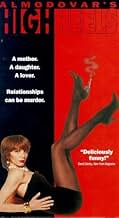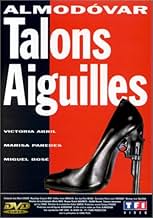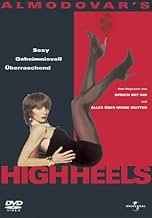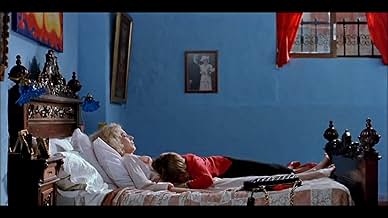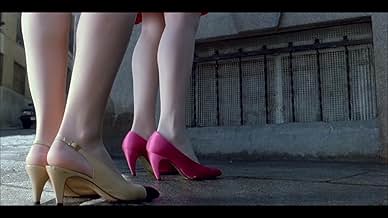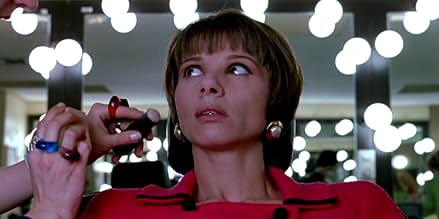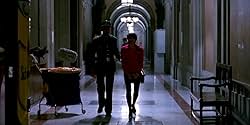IMDb-BEWERTUNG
7,0/10
18.368
IHRE BEWERTUNG
Eine Sängerin kehrt nach 15 Jahren im Ausland zurück, um in Madrid aufzutreten, und findet ihre 27-jährige Tochter mit einem Ex-Geliebten ihrer Mutter verheiratet.Eine Sängerin kehrt nach 15 Jahren im Ausland zurück, um in Madrid aufzutreten, und findet ihre 27-jährige Tochter mit einem Ex-Geliebten ihrer Mutter verheiratet.Eine Sängerin kehrt nach 15 Jahren im Ausland zurück, um in Madrid aufzutreten, und findet ihre 27-jährige Tochter mit einem Ex-Geliebten ihrer Mutter verheiratet.
- Auszeichnungen
- 10 Gewinne & 8 Nominierungen insgesamt
Anna Lizaran
- Margarita
- (as Ana Lizaran)
Mayrata O'Wisiedo
- Madre del Juez Domínguez
- (as Mairata O'Wisiedo)
Féodor Atkine
- Manuel Giner
- (as Feodor Atkine)
Bibiana Fernández
- Susana
- (as Bibi Andersen)
Juan José Otegui
- Capellán Hospital
- (as Juan Jose Otegui)
Montse García Romeu
- Maquilladora 1.ª
- (as Montse G.ª Romeu)
Empfohlene Bewertungen
A very enjoyable, intricate tale that elevates its somewhat mundane plot by turning things in a new direction whenever it starts to get stale. It's got a lot of the usual Almodovar stamps: high melodrama mixed with black comedy, insane coincidences, twisted relationships and of course dazzling use of color. Early on the theme of mother-daughter rivalry reminded me of AUTUMN SONATA, so I was quite tickled to hear the relationship being directly compared to that film later on. The movie doesn't have the magic of Almodovar's best works, perhaps because the performances as a whole aren't that impressive. However, even second-tier Almodovar is better than most stuff out there... it's got some really good laughs and an engaging series of twists and reversals. The out-of-nowhere prison dance scene is delightfully offbeat (although I felt like Almodovar was actually holding back a bit).
A girl's mother returns after fifteen years to find her daughter has married one of her (the mother's) old boyfriends. They try to mend their broken mother/daughter relationship and deal with their common lover.
Roger Ebert said that "Pedro Almodóvar's films are an acquired taste, and with High Heels I am at last beginning to acquire it." I can understand this. Some of his work I like an some I think is just alright. This film happens to be one I liked, combining the Almodovar use of color with some interesting plot and character twists.
I do not recall if I have seen Douglas Sirk's "Imitation of Life", which this film was in part inspired by. Either way, it makes me want to see it now because Sirk was one of the best of his generation and it is no wonder he has inspired so many (though mostly in Europe, it seems).
Roger Ebert said that "Pedro Almodóvar's films are an acquired taste, and with High Heels I am at last beginning to acquire it." I can understand this. Some of his work I like an some I think is just alright. This film happens to be one I liked, combining the Almodovar use of color with some interesting plot and character twists.
I do not recall if I have seen Douglas Sirk's "Imitation of Life", which this film was in part inspired by. Either way, it makes me want to see it now because Sirk was one of the best of his generation and it is no wonder he has inspired so many (though mostly in Europe, it seems).
Aldomovar is one of the few male directors on the planet who is a true artist and painting a portrait with female emotions. Using garish sets, outrageous humor, and witty songs, Aldomovar expertly juxtaposes the absurdity of what we fleetingly but devoutly believe is truly important with eternal truths. If you speak Spanish, then you are privy to another layer of wry duality that really doesn't translate through the subtitles. Abril is remarkable as the returning mother finding things turned upside down and ultimately doing it one or two better. Highly recommended.
Do you have one singular childhood memory that would seem insignificant to the rest of the world? Rebeca does and it has defined her life of trying to be somebody that her famous mother will notice.
Rebeca and Becky's final realization of each other's own self finally comes in the unselfish gesture that defines motherhood -- sacrifice.
Although this movie is listed as a drama, the madness surrounding most of Almodovar leading ladies is ever present. Raunchy and racy, as well as tender and sweet, this movie is well worth the look if you can find it.
Rebeca and Becky's final realization of each other's own self finally comes in the unselfish gesture that defines motherhood -- sacrifice.
Although this movie is listed as a drama, the madness surrounding most of Almodovar leading ladies is ever present. Raunchy and racy, as well as tender and sweet, this movie is well worth the look if you can find it.
I like the films made by director Pedro Almodóvar and 'Tacones Lejanos' ('High Heels') is no exception. Even his lesser film ('Kika') have something to enjoy, most of all because they are so very different from other films you have seen. Like a Tarantino-film, an Almodóvar-film is sort of like a genre on itself. Although Almodóvar reached greatness with 'Todo Sobre Mi Madre' and especially 'Hable Con Ella', his earlier films like 'Mujeres al Borde de un Ataque de Nervios' and this one are a lot of fun. He mixes so many genres here, uses symbolism in such an effective way, the least thing it does is being original. I guess there is nothing wrong with that.
The story involves a daughter Rebeca (Victoria Abril), her famous mother Becky (Marisa Paredes) who returns to Spain after fifteen tears, a murder that could have been committed by Rebeca, Becky and a third suspect, Judge Domínguez (Miguel Bosé) who is on the case, and a lot of colorful supporting characters. I could tell you more but the plot is not really the issue here. Although this films sounds like a drama, maybe a detective or a thriller even, it is closer to a comedy because of the way Almodóvar handles the absurd situations. There is a scene where Rebeca, an anchorwoman, tells something about the murder where she herself is one of the suspects. Next to her sits a woman who does the news in sign language. The whole scene, which is dramatic in what it tells us, is one of the best moments of comedy I have seen.
Of course the themes here are really dramatic. Not only we have the murder, we also have Rebeca who has wanted to impress her mother her entire life. It is just that Almodóvar creates a world that reminds you of a soap opera that can bring comedy out of every dramatic event. That his film is more serious than you might think is proved by the symbolism he uses. Scenes where Rebeca is temporarily in prison show her in a symbolic way how she feels. In another beautiful scene we see Rebeca driving her car, but it is the wall on the background that draws her attention. It is like her entire life is written on the wall. Almodóvar who loves to use bright colors finds an effective way here to use them, representing the state the character is in. It is not only effective it is quite beautiful to look at as well.
The story involves a daughter Rebeca (Victoria Abril), her famous mother Becky (Marisa Paredes) who returns to Spain after fifteen tears, a murder that could have been committed by Rebeca, Becky and a third suspect, Judge Domínguez (Miguel Bosé) who is on the case, and a lot of colorful supporting characters. I could tell you more but the plot is not really the issue here. Although this films sounds like a drama, maybe a detective or a thriller even, it is closer to a comedy because of the way Almodóvar handles the absurd situations. There is a scene where Rebeca, an anchorwoman, tells something about the murder where she herself is one of the suspects. Next to her sits a woman who does the news in sign language. The whole scene, which is dramatic in what it tells us, is one of the best moments of comedy I have seen.
Of course the themes here are really dramatic. Not only we have the murder, we also have Rebeca who has wanted to impress her mother her entire life. It is just that Almodóvar creates a world that reminds you of a soap opera that can bring comedy out of every dramatic event. That his film is more serious than you might think is proved by the symbolism he uses. Scenes where Rebeca is temporarily in prison show her in a symbolic way how she feels. In another beautiful scene we see Rebeca driving her car, but it is the wall on the background that draws her attention. It is like her entire life is written on the wall. Almodóvar who loves to use bright colors finds an effective way here to use them, representing the state the character is in. It is not only effective it is quite beautiful to look at as well.
Wusstest du schon
- WissenswertesPedro Almodóvar often brings a scene or character from his previous film to be reused in his next production. In this case, Victoria Abril would go to star in Kika as another TV journalist.
- PatzerThe phone that rings after Rebecca comes home after getting out of jail is muted, yet it rings.
- Zitate
Becky del Páramo: My daughter, Do you hate me?
Rebeca: No , I love you very much mother.
Becky del Páramo: I was afraid you hated me.
Rebeca: I hated you sometimes, but even on those times I never stop loving you.
Top-Auswahl
Melde dich zum Bewerten an und greife auf die Watchlist für personalisierte Empfehlungen zu.
- How long is High Heels?Powered by Alexa
Details
Box Office
- Bruttoertrag in den USA und Kanada
- 1.710.057 $
- Eröffnungswochenende in den USA und in Kanada
- 74.103 $
- 22. Dez. 1991
- Weltweiter Bruttoertrag
- 1.710.876 $
- Laufzeit
- 1 Std. 52 Min.(112 min)
- Seitenverhältnis
- 1.85 : 1
Zu dieser Seite beitragen
Bearbeitung vorschlagen oder fehlenden Inhalt hinzufügen

